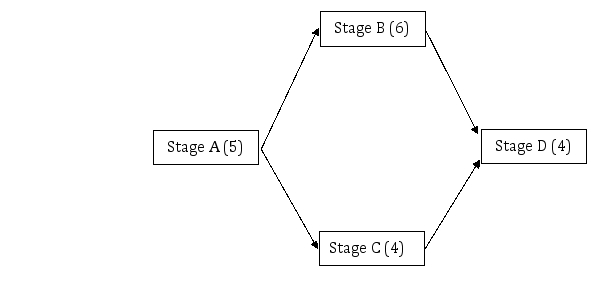Multiple Choice
Steve, an operations manager at Clan Corp. is promoted to manage the process defined by the four stages A to D below. This process could be human resource management, marketing, accounting, finance, or engineering process, and Steve is the manager. This is his chance to impress his boss and get promoted again. After three months on the job, Steve realizes something is not right with the process. His employees experience big pile up of work, things take too long to be processed, the opportunity for error is increasing, and the entire process is almost chaotic. Do a process and capacity analysis of this process. The numbers in parenthesis (#) are the time in minutes to complete one unit of work. Demand on the process averages 30 units per hour and each unit must be worked on by all four stages. Administrative clerk(s) do Stage A work. The assistant manager(s) are cross-trained to do both Stages C and D work. The coding specialist(s) do Stage B work.
SHAPE \* MERGEFORMAT


-The total process (throughput) capacity in units per hour for the four-stage process A to D assuming 3 administrative clerks, 3 coding specialist, and 3 assistant managers on duty is:
A) less than 10 units per hour.
B) more than 10 units but less than or equal to 20 units.
C) more than 20 units but less than or equal to 30 units.
D) more than 30 units but less than or equal to 40 units.
Correct Answer:

Verified
Correct Answer:
Verified
Q54: Revenue management systems (RMS):<br>A) consist of standard
Q55: A firm will encounter short periods of
Q56: A food packaging plant has planned shipments
Q57: Average safety capacity or a capacity cushion
Q58: For a Marriott hotel call center, the
Q60: Which of the following is NOT a
Q61: A pharmacy lab is used for
Q62: Perform a capacity analysis of the
Q63: Revenue management systems allocate nonperishable assets across
Q64: A medical equipment testing and calibration